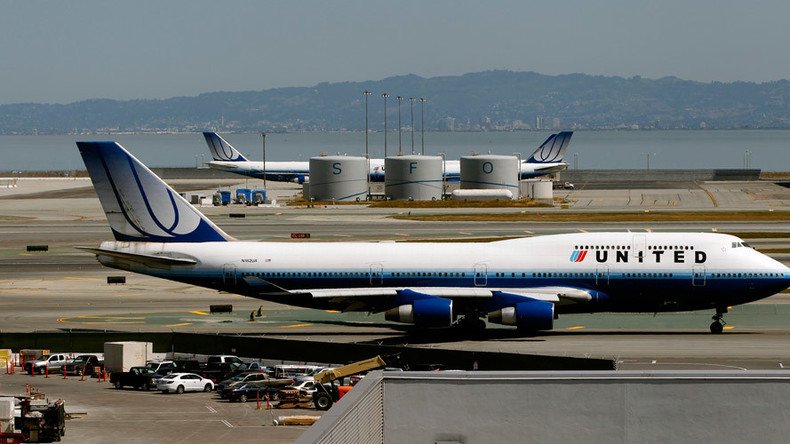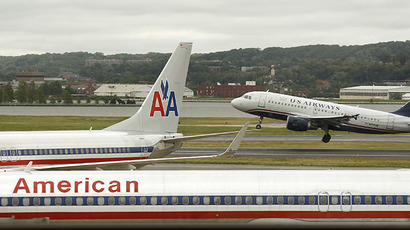‘No-brainer’? No-fly list remains controversial across political spectrum

The no-fly list, a database that the FBI uses to prevent people from boarding planes in the United States, has incurred new scrutiny from both the left and the right since President Obama suggested that those on the list should not be able to buy firearms.
Originally established by the George W. Bush administration in 2003, it was seen as a measure to help prevent another attack similar to 9/11 – but it doesn’t have a reputation to match its noble goal. While national security hawks and President Obama hail the measure as essential to the safety of Americans, critics from the left and right say that it ignores due process, creates a false sense of security and can be used to arbitrarily deprive people of their rights.
‘A no-brainer’ to Obama
After the San Bernardino shootings, the suspects in California were revealed to have ties with Islamic terror groups, President Obama urged Congress to prohibit anyone on a no-fly list from purchasing a gun.
Closing the No-Fly List loophole is a no-brainer. #DoSomethingpic.twitter.com/UzbNQbUnor
— Barack Obama (@BarackObama) December 8, 2015“Right now, people on the no-fly list can walk into a store and buy a gun. That's insane,” the president said during an address to the nation from the Oval Office.
“What could possibly be the argument for allowing a terrorist suspect to buy semi-automatic weapon? This is a matter of national security.”
The argument is due process
Critics quickly pointed out that the argument against the proposal of the president – who taught courses in constitutional law at the University of Chicago – would be illegal under the Fifth Amendment’s due process clause. Since the no-fly list is arbitrary and secretive, with names on it based on “reasonable suspicion,” constitutional rights cannot be suspended.
UCLA Law Professor Eugene Volokh argued at the Washington Post that the measure would be clearly illegal and violate civil liberties. He used a metaphor where he substituted Obama’s call to restrict gun rights with an equivalent call to restrict speech rights based on mere suspicion:
“Congress should act to make sure no one on a no-fly list is able to [hold a position at a mosque, or have gatherings of people at his home]. What could possibly be the argument for allowing a terrorist suspect to [do something that could lead others to become terrorists]? This is a matter of national security.”
A lawsuit initiated by the American Civil Liberties Union resulted in the government admitting that people are placed on the list based on mere suspicion instead of hard evidence, and the government fails to offer those on the list "meaningful notice, evidence and a hearing,” the organization said, according to The Washington Post.
Congressional Democrats heed the call
Despite experts pointing out that the measure would be illegal, Senator Dianne Feinstein (D-California) and other democrats spearheaded efforts to implement Obama’s plan.
“We don’t do anything. We as the legislative body of this country do nothing,” Senate Minority Leader Harry Reid (D-Nevada) said on the Senate floor. “So I have a question for every member of this body: How can we live with ourselves for failing to do the things that will reduce gun violence?”
It's interesting to see Republicans weasel and waffle to explain why someone who is too dangerous to fly should be allowed to buy a gun.
— Senator Harry Reid (@SenatorReid) December 7, 2015The bill failed with a vote of 45-54. Senator Heidi Heitkamp (D-North Dakota) voted with Republicans to reject the measure, while Senator Mark Kirk (R-Illinois) joined Democrats to support the bill.
Secret, sloppy evidence
The no-fly list has drawn criticism for its arbitrary nature since its implementation, with many noting that paperwork errors, or even having a similar name to a terror suspect, can land someone on the list.
"The problem with any kind of watch list is that it's always going to be both under- and over-inclusive. It suffers on both accounts,” Tim Sparapani, privacy consultant at SPQR Strategies and former senior legislative counsel of the ACLU, said to The Washington Post. “It causes so many problems that it really leads us to question the worth of having a list like this."
The late Senator Ted Kennedy, a famed Democrat and the fourth-longest serving Senator in the history of the US Senate, was placed on the no-fly list by accident in 2005.
“I got on the watch list last April,” Kennedy said at a 2005 Senate Judiciary Committee hearing. “I was taking a plane to Boston and I get out to USAir at about a quarter to seven and I get my ticket. And they say, ‘We can’t give it to you.’ And I said, ‘Wait a minute there must be some sort of mix-up.’”
Senator Kennedy, who died in 2009, eventually managed to board the plane, but his troubles continued when he was barred from his return flight to Washington.
“So my administrative assistant talked to the Department of Homeland Security and they said somebody made a mistake,” Kenny said. “It happened three more times. And finally Secretary [Tom] Ridge called to apologize. It happened even after he called to apologize, because my name was on the list at the airports and with the airlines and with the homeland security.”
An illusion of security
While the no-fly list has been hailed as a measure that will keep Americans safe from future terrorist attacks, critics say that the list sacrifices due process for no real gain in security and shouldn’t be used to curb freedoms until it’s reformed.
“It’s better for the government to focus on known terrorists and have a tiny list than have a bloated list that comprises hundreds of thousands of individuals and diverts attention and resources away from the target,” Tim Sparapani told the Guardian. “It is the illusion of security without the enhancement.”
‘If Congress will not act, we in the states will’
Despite legal scholars panning the idea as unconstitutional, Connecticut’s Democratic governor Daniel Malloy announced Thursday that he plans implement no-fly gun ban in his state following the bill’s failure in Congress.
'An a**-load of guns': Cops still counting weapons seized in S. Carolina home https://t.co/cmEvU43pB7pic.twitter.com/qdGys4j3Iw
— RT America (@RT_America) December 5, 2015"This is a moment to seize here in America," Malloy said during a press conference. "It is incumbent upon leaders at all levels of government to protect its citizenry."
Malloy plans to get access to federal government databases including but not limited to the no-fly list. Those who are on such watch lists would be banned from purchasing all guns and ammunition.
"If Congress will not act, we in the states will," Malloy said.
As of August 2013, 800 Americans are part of the 47,000-person watch list maintained by the FBI, a leak to The Intercept revealed.














